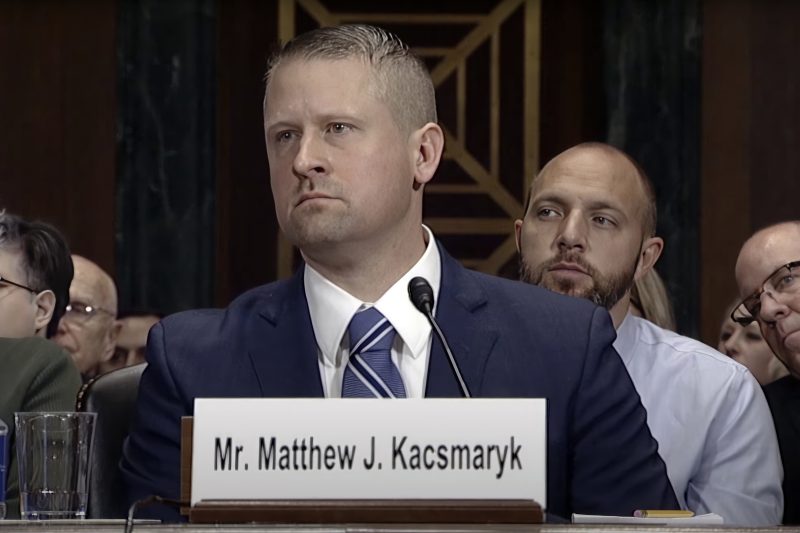When Judge Matthew Kacsmaryk was a young father, his wife captured much of their daily life on a parenting blog that highlighted the family’s strong antiabortion beliefs.
One photo showed one of their children, a toddler, in a T-shirt that read “I survived Roe v. Wade.”
“As you might guess, Matt LOVES this shirt,” Kacsmaryk’s wife wrote in January 2009, referring to her husband. “I put it on her today not even realizing that today is the anniversary of Roe v. Wade.”
Now, 14 years later, as a 45-year-old federal judge in Amarillo, Tex., Kacsmaryk lives in the same antiabortion world he has inhabited his entire adult life, surrounded by friends and family who abhor the procedure, while holding the same views himself, as The Washington Post reported in February. Those perspectives, rooted in deeply held Christian beliefs, have swirled around him over the past five months as he deliberated whether to revoke government approval of a key abortion drug — a decision with nationwide implications that some close to him felt he was destined to make.
As his sister, Jennifer Griffith, said in the weeks leading up to the ruling: “I feel like he was made for this.”
On Good Friday — the Christian holiday marking Jesus’ crucifixion — Kacsmaryk delivered the ruling they had hoped for.
In a 67-page decision, he put a hold on the U.S. Food and Drug Administration’s approval of mifepristone, used in over half of all abortions in the United States. Kacsmaryk wrote in his opinion that the approval process was rushed and that the pill is unsafe, arguments that have been debunked by leading medical associations. The ruling will not take effect for at least seven days, and it was quickly met Friday night with a contradictory opinion from a judge in Washington state. The case could go to the conservative-leaning U.S. Court of Appeals for the 5th Circuit and then probably end up at the Supreme Court.
Since Kacsmaryk joined the federal bench in 2019, many of his decisions have been wins for the right. In a practice known as “judge shopping,” conservative groups have zeroed in on the Amarillo division of the Northern District of Texas as a go-to place to challenge a wide range of Biden administration policies. Because Amarillo is a federal district with a single judge, plaintiffs know their arguments will be heard by Kacsmaryk — who was nominated by then-President Donald Trump and, like any federal judge, is positioned to issue rulings with nationwide implications.
(Kacsmaryk is also presiding over a lawsuit filed by anti-vaccine activists led by Robert F. Kennedy Jr. that accuses several media outlets, including The Washington Post, of colluding to censor their views on coronavirus vaccines.)
Antiabortion advocates celebrated both the substance of Kacsmaryk’s ruling and the language he used to craft his points. The judge referred to fetuses as “unborn humans” or “unborn children” and doctors who provide abortions as “abortionists” — terms often invoked by the antiabortion movement. He implied that abortion is a form of social Darwinism, a theory used to justify the discredited and racist practice of eugenics, which aimed to “improve” the human race through planned breeding based on genetic traits.
“Though eugenics were once fashionable in the Commanding Heights and High Court, they hold less purchase after the conflict, carnage, and casualties of the last century revealed the bloody consequences of social Darwinism practiced by would-be Übermenschen,” Kacsmaryk wrote in the ruling.
The judge and his wife did not respond Saturday to requests for comment, but The Post interviewed several people close to him. Some were in touch with him during his deliberations on the abortion pill case and noted that he was clearly comfortable with the public knowing the depth of his personal convictions about abortion.
“I think he isn’t afraid for people to know he has personal beliefs on it,” said one friend who saw Kacsmaryk in the weeks ahead of the ruling and, like others in this story, spoke on the condition of anonymity to describe private interactions.
His decision to use the term “unborn human” instead of “fetus,” in particular, is unsurprising, the friend added. Kacsmaryk was deeply affected by the death of his stillborn daughter, Tyndale, in 2006 — an experience that deepened his belief that life starts in the womb, the friend said.
“They viewed their baby as a human, and they wished they’d been able to bring her home,’ the friend said.
Kacsmaryk’s wife’s parenting blog, which includes dozens of entries from between 2008 and 2010, features a picture of the family’s mantel at Christmas — where a photo of the couple’s stillborn daughter is perched above a stocking with her name.
All of Kacsmaryk’s friends interviewed for this story maintained that despite his personal views, the judge has a deep respect for the rule of law and would not let his beliefs intervene in how he rules. Kacsmaryk carefully considered all of the arguments on both sides, said several friends who read the ruling. In mid-March, he sat for over four hours of oral arguments on the case in his Amarillo courthouse.
“He is obviously very careful in how he analyzes and assesses and applies the law to the facts,” said Mike Berry, vice president of external affairs at First Liberty Institute, the conservative legal group where Kacsmaryk used to work as deputy general counsel. “I feel very confident that any word or term that Judge Kacsmaryk has used he has supported with case law.”
When Kacsmaryk appeared before the Senate in 2017, he vowed to be fair in his rulings.
“As a judge, I’m no longer in the advocate role,” he said. “I’m in the role of reading and applying with all good faith whatever Supreme Court and 5th Circuit precedent is binding.”
As he prepared to issue the decision, Kacsmaryk was subdued and seemed to lack his usual joy, according to two friends who recently spoke with him. The decision was clearly weighing on him, the friends said, and the judge at times seemed lonely.
The judge has been particularly concerned about security threats, they said. Armed U.S. marshals were stationed by the door at a recent event he attended to ensure Kacsmaryk’s safety, one friend said.
While Kacsmaryk did not speak with friends about the substance of his ruling, one friend said he consulted with colleagues in the legal field about whether it’s a good idea to issue a stay along with a potential ruling. But, the friend said, Kacsmaryk did not specify at the time that he was asking about the abortion pill case.
Since the ruling, the judge has been both decried and celebrated by people on opposite ends of the abortion debate. Abortion rights advocates condemned him as a zealot, manipulating the law for his own ends, while abortion opponents held him up as a champion.
“The fact that a federal judge is finally paying attention to the questions we’ve been raising for 22 and a half years… it’s vindication,” said Kristan Hawkins, the president of Students for Life, a national antiabortion organization.
Most of Kacsmaryk’s closest friends and family members staunchly oppose abortion.
Kacsmaryk’s sister, Griffith, whom he describes as his “hero,” spoke to The Post earlier this year about her experience with unexpected pregnancy at age 17. She left her home to live in a maternity house a few hours away, then put her son up for adoption.
That experience, she said, was formative to her and her brother’s antiabortion beliefs.
In 2016, Kacsmaryk joined the board of the maternity home where his sister lived, Christian Homes and Family Services. The organization offers housing and adoption services to women facing unexpected pregnancies — with the goal of providing an alternative to abortion.
“He’s very passionate about the fact that you can’t preach pro-life and do nothing,” Griffith said. “We both hold the stance of you have to do something. You can’t not.”
When her brother joined the federal bench, Griffith took his seat on the board of the maternity home, and she shares her antiabortion views with her friends and family on Facebook.
“I truly am encouraged that the pro-life movement is growing! This is a new generation,” she wrote in 2019. “Even a young child can understand that it is NOT ok. It is against our human nature at a very basic level.”
The Kacsmaryk siblings were taught from a young age that abortion was wrong.
Kacsmaryk’s mother, Dorothy, a microbiologist, was particularly passionate about antiabortion issues, Griffith said. Once she joined the Church of Christ in Fort Worth and decided to stay home with her children, Griffith said, she started questioning much of what she learned as a scientist, especially that a fetus was “just a clump of cells.” She worked with nearby crisis pregnancy centers, antiabortion organizations that try to persuade women to carry their pregnancies to term.
Dorothy Kacsmaryk did not respond for a request for comment.
Growing up, most of Kacsmaryk’s life revolved around the church he attended with his family, the West Freeway Church of Christ. He met his wife at church, where they got to know each other during services three times a week, according to her blog.
Now, in Amarillo, faith has continued to be central to Kacsmaryk’s life, according to several people who know the judge.
Friends said they weren’t sure why Kacsmaryk had chosen to issue his ruling on Good Friday.
Maybe he was trying to limit his media coverage, one said — or maybe he was trying to make a point.








